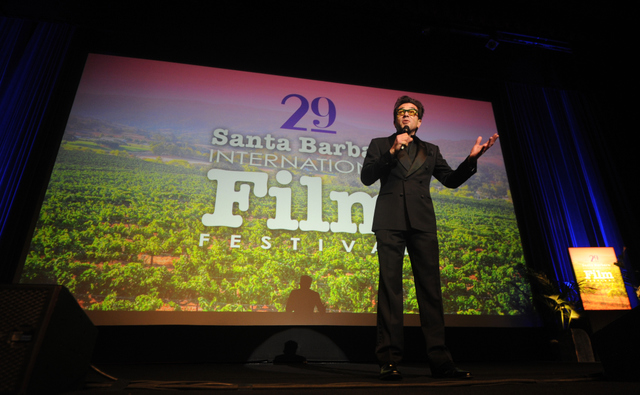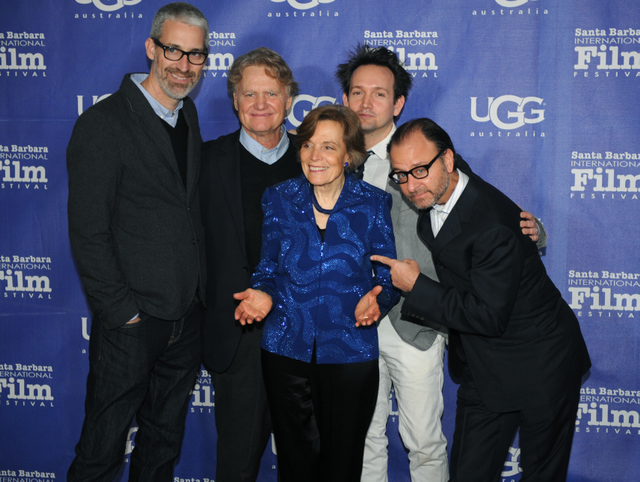Jumping Into the Ocean of Cinema

For a film which grandly and passionately celebrates the majesty and mystery of the world’s oceans, and which eloquently pleads for their preservation, Mission Blue — SBIFF’s opening night film — has some clearly sobering messages attached. You may have at least momentary trepidations at your next sushi or seafood op, and gain new, chilling insight into the dire state of our oceans in the age of climate change and over-fishing. In a town like Santa Barbara, where the ocean partially defines who we are and why we live here, the effect was a combination of inspiration and despair…meets a desire to help effect change. In other words, the eco-doc does its job, with flair to spare.

Suffice to say, this was not the typical opening night fare for the festival, and a first-time occasion when a nature documentary filled the kick-off bill. As exec director Roger Durling explained to the sold-out house on Thursday night, directors Fisher (The Cove) Stevens and Robert Nixon’s Mission Blue — a fascinating and visually striking portrait of the veteran but still uber-energized and impassioned oceanographer Sylvia Earle, with articulate commentary by Santa Barbara’s own James Cameron — came into the programming picture at the 11th hour, as a substitute for another film which fell out of the running. Alas, the festival fates were with him, and this year’s Klieg light-flecked kickoff was one of the more positive opening night experiences in memory.
On a poignant and festival-centric note, the film is dedicated to and also briefly features famed nature filmmaker and SBIFF hero Mike deGruy, who tragically died in a helicopter accident on the job two years ago — and during festival time. Durling invoked the memory and message deGruy represents, as someone blessed with a “sense of wonder and exploration.” As Earle herself, joining filmmakers onstage, told the sold-out crowd at the Arlington, it was DeGruy’s “mission to take care of the ocean.” Ditto, the force of nature that is Sylvia Earle.

OCCUPATION HAZARDS: Palestinian director Hany Abu-Assad, whose film Paradise Now seized attention for its artistry and real worldly relevance, has another powerhouse film to his credit, Omar, a stunning but also cinematically subtle account of a young Palestinian freedom fighter’s struggles with rebellion, torture, betrayal, revenge and the gnawing power of love through its tangles and thwartings. While the film justifiably earned an Oscar bid for best foreign film, its darker elements and seriousness will probably limit its chances in a category usually given over to feelgood choices.
Despite Omar’s inherently gritty aspects, moral challenges, and hot button dealing with the controversial Israeli/Palestinian “The Wall” in the West Back, the film touches as deeply as it does because of its impressively graceful filmic language. Without passing judgment or condoning violence, the story is told with a careful balance of calm and tension, stillness and volatile bursts of action, with the very wall in question as both symbol and unclimbable obstacle.
As a first encounter with the early morning slot of the festival’s increasingly popular “Breakfast Club” programming (recommended for anyone looking for the good stuff at a less-busy hour), Omar was anything but an easy-going confection. Then again, the early morning fest-going crew can expect to find films of substance and serious intent on the “Breakfast Club” menu — along with the lighter fare.
Speaking of substance and serious intent, we know we’re a far distance from Hollywood with Austrian Gotz Spielmann’s October November, a cool, contemplative and slow-brewing, but also emotionally potent tale of two sisters, and much more. A quiet, patient and visually-glowing film (with a disarming, short out-of-body detour), it proceeds with a minimalist sparseness in many ways. But its narrative reach doesn’t extend far beyond the interwoven lives of one sister caring for her dying father in the family’s country lodge, and the other a well-known actress breezing through a life with artificial passions and a search for a center. She tells a character about her childhood dream of being admired and loved: “Admired and loved? Is it possible to have both?”
Into this soup of family and existential curiosities enter surprising winds of spiritual questioning, infidelities from various angles, and larger themes of trying to make sense of fates, from childhood to “the other side.” As the film veers into a final act reminiscent of Cries and Whispers or Amour, the emotional endgame is less purely mournful than resigned, an amen cadence of a roughly agnostic sort.



